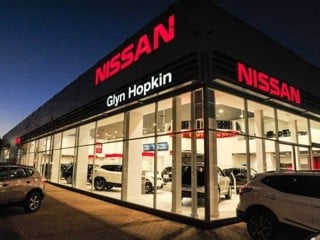In today’s healthy new car market, it would be very easy to assume the carmaker’s brand is far and away the primary one in the retailing equation.
A manufacturer’s product marketing brings consumers to the dealerships. Once they are inside, its influence and rules then ensure, as much as possible, that the dealer completes the transaction to their satisfaction.
After the recession, the pressure is back on dealers to invest more in premises and technology and pay increasing attention to processes defined by the manufacturer to ensure a uniformity of experience throughout their centres, generating the expectation of universal goodwill among customers.
In today’s healthy new car market, it would be very easy to assume the carmaker’s brand is far and away the primary one in the retailing equation.
A manufacturer’s product marketing brings consumers to the dealerships. Once they are inside, its influence and rules then ensure, as much as possible, that the dealer completes the transaction to their satisfaction.
After the recession, the pressure is back on dealers to invest more in premises and technology and pay increasing attention to processes defined by the manufacturer to ensure a uniformity of experience throughout their centres, generating the expectation of universal goodwill among customers.
But what happens when a manufacturer’s product is not appealing to the customer, when a model is reaching the end of its lifecycle and the replacement is still some way off and the marketing campaign hasn’t started that will generate customer enquiries? Or what happens when a manufacturer’s product line-up is not as comprehensive as competitors’? If it has no MPV or mini-SUV?
To dealer group Glyn Hopkin, the answers to those questions are clear: the dealer steps in and its highly, continuously trained staff use their sales skills to ensure business takes place, sometimes despite the manufacturer model cycle.
The Romford-based group has more than 30 dealerships at 20 locations and has been growing recently – with the acquisition of a Marshall’s Nissan site in Cambridge in October – but from its formation in 1992 the principles have always been embedded.
Managing director Fraser Cohen explained that from day one – with no staff, no track record or customer base – founder and chairman Glyn Hopkin saw the business as a blank canvas “to commit 100% to doing things right”.
Cohen, who was Hopkin’s sales manager at the time, said: “Today, there’s a lot of emphasis on customer care and manufacturers put a lot of money behind it, but when the business first started, that wasn’t the case. It was down to us to motivate staff to do the best for customers. We said it then and we say it now in our inductions, if you’ve got good, motivated staff who want to look after customers, you’ll have a loyal customer base and the business will thrive.”
From the outset, staff wore Glyn Hopkin uniforms and name badges. Cohen said it wasn’t unusual for shoppers in his local supermarket to stop him and say “you work for my local dealer, don’t you?” as the business rapidly grew from a Nissan site in its hometown into Chelmsford, St Albans and Leyton in the 1990s with the Japanese brand.
[page-break]
Anecdotes aside, the numbers support Hopkin’s belief. In the 10 years to 2013, turnover increased 171% and profit 377%. Turnover for Nissan – Glyn Hopkin’s main brand partner – in the same period grew 111% to £193 million. For its second most represented brand, Fiat, turnover increased by 311% to £59.5m. Nissan and Fiat represent 65% and 20% respectively of Glyn Hopkin’s turnover.
The group’s return on sales tracks about 1.7% and 1.8% in recent years. Cohen said he believes it can go beyond 2% in the next five years and he expects turnover to increase to £500m.
“The senior team is always challenging the business to be better, more efficient, with an emphasis on improvement,” Cohen said.
“All the directors are shareholders, so the leadership has a vested interest in seeing the company succeed and a desire to continually innovate and improve profitability.”
This pressure is most obvious in the way staff are trained and motivated.
“We work people very hard here,” said Cohen. “We are constantly monitoring performance and trying to find ways to improve on it.”
The approach has had its rewards in high retention levels. The group has just more than 600 staff, of which about 200 are in sales roles. Some 13 staff have been there more than 20 years, 109 between 10 and 20 years and 101 from five to 10 years.
Such dedication is rewarded. There’s a range of incentives from an extra day’s holiday each year beyond five years service (to a maximum of seven days extra) to £2,000 and a Mont Blanc pen for those achieving 20 years.
How recession revealed the power of the dealer brand
Cohen speaks of the power of the dealer group’s brand, which has worked successfully through considerable challenges over the past 20 years.
“You can’t beat a buoyant market with supportive manufacturers, and product is always going to be key,” he said.
“But if you look at how successful we’ve been, throughout difficulties like recessions, and with the Nissan franchise that hasn’t had the share it now enjoys, together with Fiat and its product challenges.
“The fact we have been consistently successful with our manufacturer partners – and haven’t done this [with] the top three [brands] in the marketplace, or prestige marques – is a testament to the way we operate and the importance of the Glyn Hopkin brand.”
Having a variety of brands, sometimes with more than one at a location, Glyn Hopkin can find solutions to customer’s needs when one can’t.
[page-break]
“If a Fiat 500 customer is looking to move into a bigger vehicle, this brand can’t meet their needs, but having been our customer for some time, they will feel confident we will give them the service they want and will be comfortable in considering suitable vehicles elsewhere in our brand portfolio.”
So, how is this level of care achieved?
Constant attention to detail, hard graft and industry-beating rewards, summarises Cohen.
The motivation starts for new staff at an induction, held every six to eight weeks, meeting group directors in the boardroom – “you can’t beat making sure fresh recruits understand the Glyn Hopkin way” – and then through continuous performance monitoring and pressure to do better.
Ongoing training is provided to new staff for six months, through in-house and manufacturer programmes, with Skillnet providing service and aftersales courses.
In 2012, the group employed an in-house sales trainer, Chris Jennings. Every salesperson will have a three-day course with Jennings.
Positive feedback from new starters led to the decision to begin using him to look at the poor performers, irrespective of the amount of time they have been with the company, through regular assessments.
“He’ll look at product presentation, for example,” Cohen said. “To try and understand why someone who has been in the trade for five years, say, but they’re struggling to meet the performance level. It might be they need guidance on closing.”
Cohen admits the group’s brand portfolio is a cause of why there is underperformance among the sales team.
“We represent great brands, but they’re not like Audi and Land Rover, with people queuing up to buy them. So we need highly motivated sales people that won’t let this obstacle get in the way.”
To aid in the selling and motivation, Glyn Hopkin has put considerable emphasis on product knowledge. Cohen believes that if customers truly entered showrooms knowing exactly what they want, as many suggest, non-automotive retailers such as Tesco, would be able to sell cars without the expertise that franchised dealers offer.
“Customers do not say ‘I know exactly what I want’, but they do know more about the make and model and the sort of spec they want. So, sales staff must know everything about a car in order to sell the benefits.”
Concentrating on product knowledge
Before key models in each brand launch, Glyn Hopkin carries out internal product knowledge assessments. These are in addition to those provided by manufacturer and include a five-point ‘walkaround’ presentation by every salesperson on the aspects every customer should be made aware of. The assessment takes place over three days and is a follow-on, in more detail, to basic product awareness insight Jennings gives new recruits.
[page-break]
Those that don’t pass the test are not allowed to sell the vehicle in question. The threat of not being able to sell Qashqai, Juke or the Fiat 500 is a considerable motivator and anyone who fails to meet the standard can re-take the test.
“The buy-in to this process is amazing and the benefits to the individual are obvious as we have sales people that are 30-40% more informed than the average. Customers will notice this very early on in their interaction with us.”
Following this process, if a salesperson is identified in a quarterly sales review as not meeting sales targets they will be invited to head office for a performance review to meet their sales manager and brand director to find out the causes.
“We do this every quarter,” Cohen said. “It is a very effective way of motivating people to pull their socks up or make the decision themselves that they are not in the right job.
“But we also want to know if we are not providing them enough support at branch level. For example, is your manager spending enough time with you? Do you not understand certain things? It can be as much of a learning experience for the sales manager as the sales person, as well as the directors. We can be very critical of ourselves, here and elsewhere in the business.”
Glyn Hopkin also has strong views on the debate about growing talent from within versus bringing it to the business from outside.
“One of our biggest challenges is providing the opportunity to satisfy staff aspirations to rise through the ranks. We make it clear at the induction that everyone can do this. Rarely do we take people on in senior roles from the outside, because our message is, if you work hard you can work here for life,” Cohen said.
How does the group prevent staff complacency generated by knowing they have a ‘job for life’?
“We track everything constantly by branch, by our targets, manufacturer targets and I see sales leads and sales figures every week,” said Cohen.
The group also has an email address, feedback@glynhopkin.com, urging customer to give their views.
Cohen says this address is used “everywhere”.
“Customers may think it goes to a call centre, but the emails come to all the operational directors. All the staff know this and if the feedback is positive, I will congratulate the staff member in question. If negative, I will ask them why. And the relevant sales manager would resolve the complaint, co-ordinated with our customer care department.”
[page-break]
The level of attention given to performance measurement and staff performance, Cohen says, is intense and for the right reasons. But it comes with rewards. Without giving details, he said Glyn Hopkin pays above the industry average.
He does not believe, as some dealer bosses have said to AM, that the pay model needs to change.
Far from believing sales staff should be paid a higher basic salary and lower commission, the group believes the existing model is right.
“It’s been suggested we pay too much to some people, but we are rewarding a job done very well. We don’t try to cap people’s earnings. If you can sell more cars and make the company more money, then we’re happy for you to share our success.
“In some businesses we’ve taken over, I’ve seen commission capped and staff will just do what’s expected to achieve the cap. Setting a limit on people’s opportunity to better themselves, and their lifestyle, is dangerous.”
Cohen has similar views about technology in showrooms. Nissan is introducing iPads, but they only support the selling process. Like other dealers, he is adamant people are needed to explain the exchange valuation, the finance availability and arrange and accompany the customer on a test drive.
“You will have to speak to a sales person,” he said. “And the way the sales person interacts is very important. Customers tell me they notice the distinction between us and our competitors in something as simple as asking for a brochure. Some dealers will hand one over and there’ll be deathly silence, no interest. Here it’s the start of a conversation.
“It’s a simple example of how we expect staff to go the extra mile for every customer, for the company and themselves.”
Glyn Hopkin's transition and growth
Glyn Hopkin has grown organically or through acquisition almost continuously in its 20-year history, steadily taking on new franchises alongside Nissan from a standing start to 33 dealerships.
It has gradually grown out of its Essex heartland – north-east to Ipswich, west to Milton Keynes and the biggest ‘stretch’ has come recently with the purchase of a Nissan site from Marshall Motor Group in Cambridge, with Fiat/Jeep being added there this year in a new-build facility.
Managing director Fraser Cohen says the expansion has come about through being offered opportunities by manufacturers, but with a desire for contiguous territories. He groups Romford, Chelmsford, Colchester and Ipswich as one, Waltham Abbey, St Albans, Watford, Milton Keynes and Bedford as another.
[page-break]
Expansion for the group will come within its current market area – and in multiples, not single-site deals. The 2011 addition of Honda franchises in Chelmsford, Romford and Colchester is an example of the group’s preferred growth step.
“We’ve reached our geographic limits,” he said.
“Our head office in Romford serves all parts of the business with group admin and call centres, etc. Once you get beyond a 90-minute to two-hour drive time from here you begin to question how often you can visit those sites and how much control you have of them.”
Glyn Hopkin doesn’t have dealer principals, believing them unnecessary in a hierarchy that instead sees sales managers reporting to brand directors, who in turn report to the board directors and Hopkin. The group has three brand directors: one for Nissan and Infiniti, one for Fiat, Chrysler Jeep and Suzuki and one for Honda and Mitsubishi.
The three spend about 75% of their time visiting sites. Cohen goes to each one every three months. “By the time you drive to a site and give it the amount of time it needs, most of the day is gone. Expanding further afield would make ensuring the hands-on approach we have very difficult,” he said.
Login to continue reading
Or register with AM-online to keep up to date with the latest UK automotive retail industry news and insight.





















James davids - 20/02/2017 18:31
Terirble company